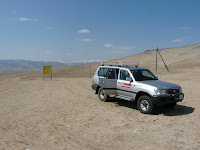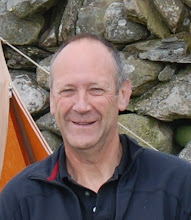



At last a trip to the countryside, escape from UB. A four day trip to Arhangai, 500km to west of UB, in the centre of Mongolia . Mercy Corps have several tourism business clients and I was going to assess the businesses, look at training needs and familiarise myself with countryside tourism.
We travelled in style, a Toyota land cruiser with MC driver and interpreter, Deegi; in the land cruiser it only took 6 hours compared to the 8 or 9 in a Russian jeep or a bus. They are building the road to the Arkhangai and the west of Mongolia, and though the sub base is down only about one third of the road is surfaced. There are still few roads in Mongolia, and there is major investment to provide roads linking the major regional centres. Away from the main centres there are no roads, just tracks across the countryside.
We skirted the northern edge of the Gobi passing sand dunes and camels; everywhere the landscape is heavily overgrazed. I knew that overgrazing and desertification are important issues in Mongolia, but was still astonished at how overgrazed and dusty the landscape was; occasional dust devils whirled across the landscape, clouds of dust marked the journey of other vehicles, and overtaking was difficult, where exactly was the vehicle in the dust cloud ahead? In 1991 there were 20 million or so animals now there are more than 40 million. With the collapse of the communist government and withdrawal of Russian support many jobs disappeared and people took to grazing livestock, many without experience. Now there are lots of poor quality animals at a time when markets are demanding quality. The overgrazing has other implications, desertification is an issue as dust storms threaten Beijing, there is also a knock on effect on wildlife as grazing extends up the hillside, the forests are destroyed by grazing, wild herbivores are threatened, wolves, snow leopards and other predators start taking more livestock, so are hunted more and the grazing pressure simplifies complex habitats. In addition climate change seems to be hitting Mongolia harder than most countries with the recorded rise in average temperatures nearly double the global average.
Mongolia must be one of the few countries in the world where people do not look forward to spring It is a difficult time for herders; the landscape was littered with dead animals, great for the black vultures and ravens, but a tough time for herders. When dry summers are followed by severe winters there is often mass starvation of animals. In 2001 and 2002 more than 10 million animals died. The Mongolians have a word for such hard springs Dzuvd.
Now back in UB the weather is windy, blowing dust everywhere with rapid changes in temperature. One day it was 25, the next day it was snowing.

No comments:
Post a Comment